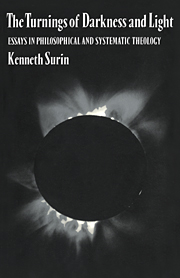Book contents
- Frontmatter
- Contents
- Dedication
- Preface
- Abbreviations
- 1 Creation, revelation and the analogy theory
- 2 The Trinity and philosophical reflection: a study of David Brown's The Divine Trinity
- 3 ‘Is it true what they say about “theological realism”?’
- 4 The impassibility of God and the problem of evil
- 5 Theodicy?
- 6 Tragedy and the soul's conquest of evil
- 7 Atonement and moral apocalypticism: William Styron's Sophie's Choice
- 8 Atonement and christology
- 9 Revelation, salvation, the uniqueness of Christ and other religions
- 10 ‘Many religions and the one true faith’: an examination of Lindbeck's chapter 3
- 11 Contemptus mundi and the disenchanted world: Bonhoeffer's ‘discipline of the secret’ and Adorno's ‘strategy of hibernation’
- 12 ‘The weight of weakness’: intratextuality and discipleship
- 13 ‘Theistic arguments’ and ‘rational theism’
- Notes
- Index of names
- Index of subjects
12 - ‘The weight of weakness’: intratextuality and discipleship
Published online by Cambridge University Press: 19 January 2010
- Frontmatter
- Contents
- Dedication
- Preface
- Abbreviations
- 1 Creation, revelation and the analogy theory
- 2 The Trinity and philosophical reflection: a study of David Brown's The Divine Trinity
- 3 ‘Is it true what they say about “theological realism”?’
- 4 The impassibility of God and the problem of evil
- 5 Theodicy?
- 6 Tragedy and the soul's conquest of evil
- 7 Atonement and moral apocalypticism: William Styron's Sophie's Choice
- 8 Atonement and christology
- 9 Revelation, salvation, the uniqueness of Christ and other religions
- 10 ‘Many religions and the one true faith’: an examination of Lindbeck's chapter 3
- 11 Contemptus mundi and the disenchanted world: Bonhoeffer's ‘discipline of the secret’ and Adorno's ‘strategy of hibernation’
- 12 ‘The weight of weakness’: intratextuality and discipleship
- 13 ‘Theistic arguments’ and ‘rational theism’
- Notes
- Index of names
- Index of subjects
Summary
All of the language of transcendence is but rhetoric unless there is a visible body of people who are able to escape conformity to the world while continuing to function in the midst of the world.
John Howard YoderUnless both the interpreter and the community are real, there is no real world.
Josiah RoyceIn his book The Uses of Scripture in Recent Theology David Kelsey has rightly observed that the authority which Scripture has for the common life of the Christian community resides in Scripture's being deployed in certain regulative and normative ways; ways which contribute to the creation, sustaining and re-formation of the community's self-identity and the personal identities of those who are gathered within it. The congregatio fidelium is what it is precisely because it gains its orientation from Scripture. Christianity, in this sense, is truly to be reckoned ‘a religion of the book’, a book which ‘renders’ or ‘depicts’ a linguistic world that is of decisive significance for Christian reflection and practice. To profess to be a Christian is thus to stand in an undeniable, though as yet unspecified, relation to this all-encompassing biblical linguistic world. Any properly theological discussion of Christian ‘discipleship’ must therefore involve some consideration of the relation that obtains between specifications of the identity of the Christian community (and the particular identities of its members) and the scriptural linguistic world.
Throughout the centuries countless proposals have of course been advanced for a recognizably Christian, and a properly theological, understanding of the normative relation which obtains between the biblical linguistic world and the identity of the community of believers.
- Type
- Chapter
- Information
- The Turnings of Darkness and LightEssays in Philosophical and Systematic Theology, pp. 201 - 221Publisher: Cambridge University PressPrint publication year: 1989



